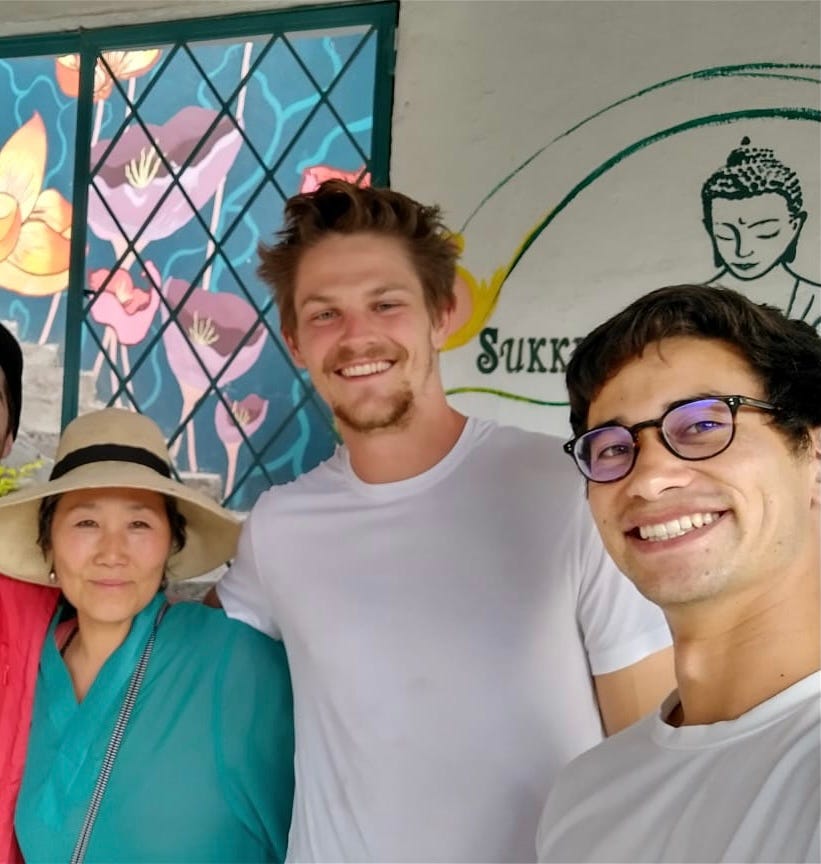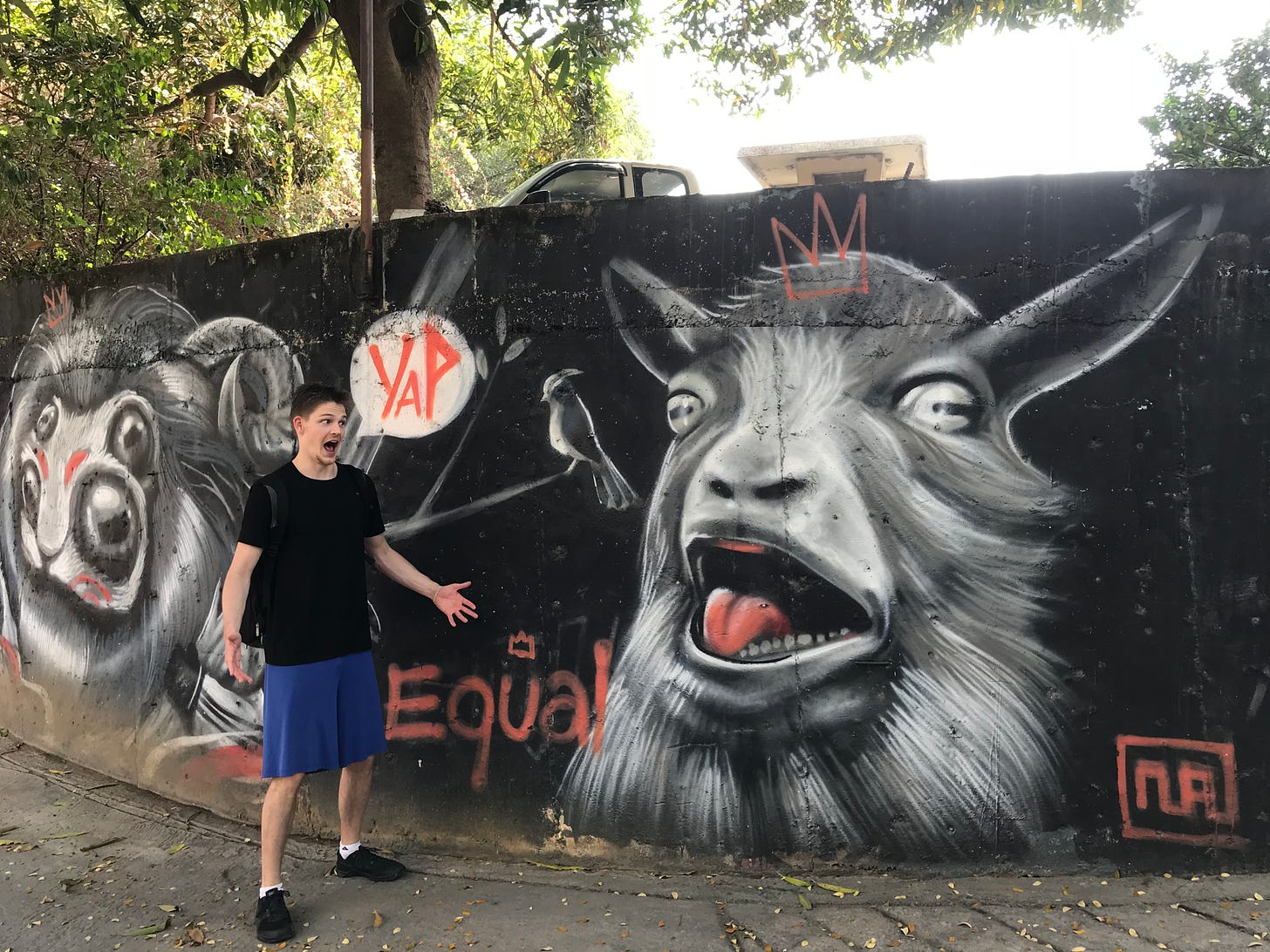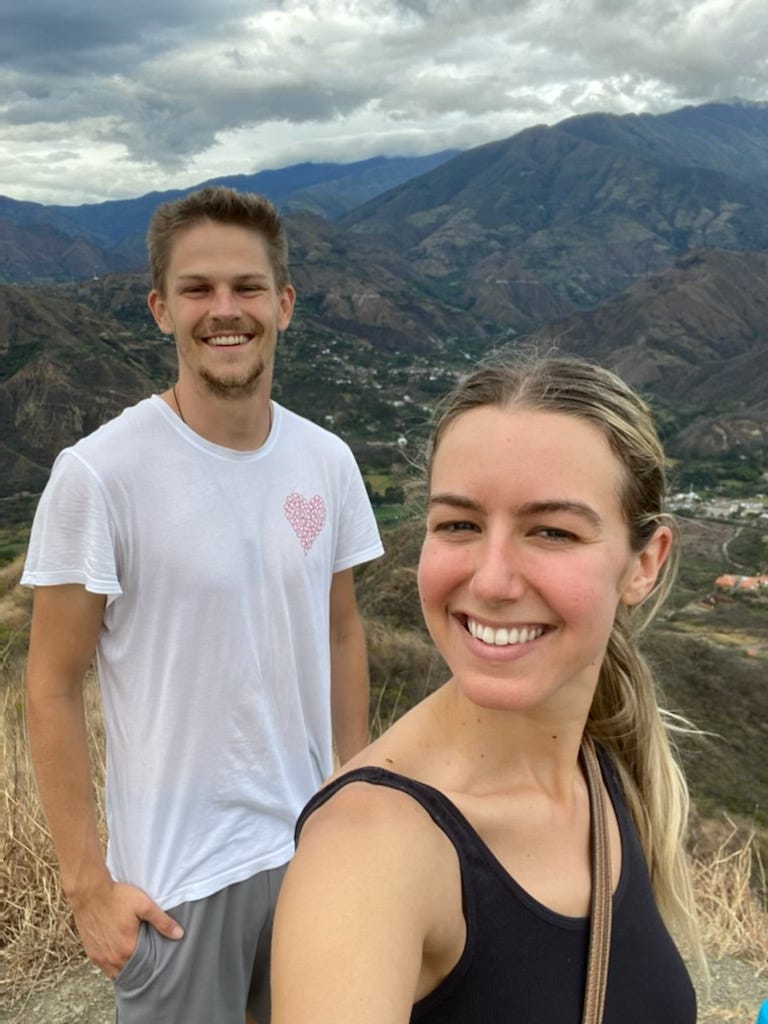Hi!
My name is Reiman, I think.
That’s what I tell people when they ask, anyway, after a momentary gap in which my human conditioning used to automatically reply, “Spencer.” I went by Spencer in school, on TV and for the first twenty-seven years of my life, less the two pre-verbal years when I went by my real name. I’ve spent most of my twenties starving on islands, ingesting psychedelics, meditating for months on end and trying to reconnect to that selfless blob who spoke the language of God — silence — before uttering his first word at twenty-four months old.
That word was “No.”
Reiman feels more like sounds I make with my mouth than like my Self, but I call my self Reiman, even though my identity now feels akin to Steven Pressfield’s description of the residents in a halfway house where he used to live:
“Everyone in the house had, in his or her own way, experienced the disintegration of their personality. Everyone had fallen a long way, fallen hard, and fallen alone. Everyone in that house had looked their own annihilation in the face, and it had scared the hell out of them.” (Turning Pro, 8)
Mama Ayahuasca helped me see that, far from being the terrifying evil we brand it as, death is not an intrinsically bad thing. Meditation has helped me see that further, there is nothing — no thing — to be afraid of. Yet, you know what still scares the hell out of me, right now, today?
Sucking at writing.
I’ve been so scared to suck, so hellbent on the pipe dream that my writing will be perfect, that I haven’t started. I’ve been pretending to write a book in a similar vein to my mental-health-focused podcast for four years now, quadrupling down on my spiritual quest of becoming nobody (as Ram Dass would put it) only to realize that I want to become somebody again. After all the dissolutions of ego and head trips of spiritual ego (it’s a real problem), after all the mindfulness, introspection, humbling, deconstruction and nobody-becoming, I want to be a writer. And ideally, I want to be a writer who doesn’t suck.
Despite being a quiet kid and making “No” my foray into speaking, I love words. They’re dualistic and they’ll never capture the transcendent Truth of nonduality I’ve been chasing, but they’re fun. They’re fun! For their own sake! Words, man. I love playing with them, and if I could anthropomorphize words, I’d find a nice one to wine, dine and standup-sixty-nine. Word.
I’m writing purely off of instincts (what else is there?) right now, which is why a decent chunk of the writing is shit. I haven’t refined my writing instincts while becoming nobody, because I haven’t been writing, and the only way to refine writing instincts is to actually write — poorly, at first. Hence me starting a… blog (I threw up a little in my mouth the first time I said the word, but hey, it’s better than tweeting). I don’t care that I’m sick with a cold today, or that this post will be far from perfect, because fuck perfect. Perfect is the enemy of good, the platitude has always sung, evidenced by my perfectionism producing zero good writing. What’s more: Perfect is the enemy of pro, as I’ve realized with the help of Andy, the little brother within my adopted Ecuadorian family:
I s’pose an explanation might be in order for those of you who know me only as the wannabe-Machiavellian Survivor contestant in a green shirt…
Ten months ago, I started exploring Ecuador after a plant medicine retreat in the Amazon, seeking a place that could support more nature and community in my life than I was finding in Chicago. Not only did I find that place, but in the months since I’ve found a home, land for a retreat center, wild iconoclastic characters for neighbors, good friends like Andy, and the aforementioned adopted Ecuadorian family of which he is a part. Maya (left in the picture above) is the mom of our expat-quasi-family, as well as the first person I met in my new hometown, where I’ve spent most of 2021 — the sacred valley of Vilcabamba, Ecuador:
As my AirBnB host back in January and Andy’s AirBnB host back in December 2020, Maya introduced the two of us, and in turn, Andy introduced me to the book — Turning Pro by Steven Pressfield — that catalyzed this first, arduous, unwieldy, belated yet miraculously existent blog post.
I previously listened to Pressfield’s The War of Art on tape, but reading Turning Pro now, I find it at once better and more inspiring than his former and better-known book. I also find Turning Pro more resonant with my life’s challenge of forging a middle way between esoteric ambitions of enlightenment and saṃsāric ambitions to write.
“The Gnostics believed that exile was the essential condition of man. Do you agree? I do.
The artist and the addict both wrestle with this experience of exile. They share an acute, even excruciating sensitivity to the state of separation and isolation, and both seek a way to overcome it, to transcend it, or at least to make the pain go away.
What is the pain of being human?
It’s the condition of being suspended between two worlds and being unable to fully enter either.
As mortal flesh, you and I cannot ascend to the upper realm. That sphere belongs to the gods. But we can’t put it out of our minds either. We can’t escape intimations and half-memories of…what? Some prior sojourn, before birth perhaps, among the immortals or the stars.” (Turning Pro, 45)
Pressfield advocates navigating this plight by “turning pro,” or transmuting the fundamental pain of existing in duality into the personal power of creating art. For me, that means burying the amateur who hides from himself as a writer. Turning pro means throwing the fear of sucking at writing to the wind, showing up and putting the time in. It means doing the formerly impossible by… writing words. It means recognizing myself as a creature of habit, and replacing habits like weed (the world’s first ever victim of crippling cannabis addiction is now seven weeks sober, heyo!) with the habit of a morning routine. Turning pro means recognizing my insanely addictive personality (not trying to spiritually bypass it), and furthermore recognizing addiction as the sneaky poser, supplanting higher aspirations, that it is. It means shunning distractions and deferring gratification (RIP my social media). It means learning the subtle art of not giving a fuck (another great book), and caring more about what I think of my writing than what you think of it. Turning pro means exorcising the ghost of some “perfect” future-Reiman who never arrives, and merely writing my best today. And tomorrow. And every damn day until I’m a writer I respect.
Turning pro is also the only thing I could be bothered to write this inevitably neurosis-infused first blog post about, despite the fact that I’ve been meaning to write daily since 2017 — the year I began proselytizing about vipassanā meditation and abandoned my job as an options trader, as well as my human relationships and life, to become a spiritual-retreat-hopping dharma bum. I can’t entirely blame meditation, mushrooms and ayahuasca for the delay in my scribbling, though. I can’t even really blame graduate school, the dead-end job and quarter-life crisis which will finally produce a master’s degree (a.k.a. a piece of paper) one month from today. The true reason for the delay is simple:
I’ve known since 2017 that my first blog post will be bad (by my standards, at least).
When anyone begins writing seriously for an audience, or doing anything seriously for an audience, it sucks. If you don’t want to take my word for it, take any successful podcast and check out its first few episodes. Even if the creators were ahead of the pack of first-time podcasters whose audio sounds like it came from 7th graders using garage band, you’ll find many creative kinks they had to work through.
I may have worked through kinks on a basic level (i.e. my grammar is fine, I can avoid obvious errors like comma splices. Fragments too.), sure. I now at least have fewer kinks in my writing than in my sexuality. However, much like the futility of a college frat bro hoping his bravado will magically help his cock do circus tricks, there’s simply no way around my lack of experience as a writer. There is no way around the struggle in any pursuit of being bad before being good. In short, I’ve procrastinated to such an inordinate degree out of the fear of being bad, even though being bad is inevitable, and is paradoxically the first step on the road to becoming good.
So, how am I finally writing something? Why are you (admittedly, only the half of you who’ve yet to close this tab) staring at actual writing, written by me?
The answer is that I’ve mentally told myself that it’s ok for this blog post, about turning pro and becoming good, to be bad. In this post, on this topic, I’m down to suck. I’ve used that word, “suck,” as well as the superbly descriptive word, “thing,” tons of tmies. I’ve taken countless parargahps thus far to repeat basically the same point, and wlil take a few mroe before I start convincing you of n-e-thing. Further, the thnig I’ll convince you of is stupidly simple. Ultimately, the way to trun pro es uttrelly obvious, yet is somthing I’m stlil wrkiong on myself: The way to turn pro and get good at things is to do them. You build mastery of a thing by doing it many, many times. That’s it.
Haven’t I done this many, many times though? Haven’t I been writing since I was six years old?
Yes and no. I’ve put my fingers on keys, produced words and strung sentences together, yes. I haven’t truly written, though. Whatever writing skill I’ve built has come within, and in spite of, an environment as toxic to quality prose as it is toxic to quality skills: School.
School does writers an immense disservice no matter the level of education (actually especially at the higher levels, which is why I read like the petulant holder of an M.A. that I am), and the disservice is this: School provides “writers” with a reader — implying their writing is somehow automatically worth reading — and then pays this reader, whether via tuition or some other system, to care. School trains us to write as if the reader, who likely has nothing to learn or gain from us and already understands the subject matter better than we do, is hooked from the first word (even if it’s an unsexy word you’d never want to standup-sixty-nine!). In academic writing, it doesn’t matter if we’re particularly engaging. There is no possibility of the reader simply getting bored and quitting a few paragraphs in, as you may be tempted to do now (why do you think I keep juicing you up by referencing impossible sex positions?). All that matters in the academy is that we regurgitate the information spoon-fed to us, and perhaps have a creative thought or two inspired by it.
Unlike a teacher or professor, an audience doesn’t care, at least not by default. An audience expects to be shown why they should care, to be promised tangible value in exchange for their time reading or their money spent. This requires a writer to abandon all prior training, to stop writing for a grade and to start writing for people — to stop posturing and start letting the reader in, to stop showing off knowledge and start sharing it. Because writing for people is hard, and school teaches us nothing about it, we suck at it in the beginning. We aren’t used to writing this way. We only stop sucking by persisting, getting feedback and marginally reducing the shittiness of our work every day, day after day.
No one is really all that special (other than me; I believe I’m special; I really do). In reality, people aren’t (usually) “cut from a different cloth.” This is why it’s a huge bummer to meet your heroes and slowly realize they’re just regular people, their mystique wearing off progressively with every moment of genuine interaction. I know this firsthand from attending charity events with fellow Survivor and reality TV contestants. All of us, even off-the-wall personalities, even people who’ve cultivated a world-class skill, are cut from a common cloth of reaping what we sow. My advice, to both myself and those of you who might want to get good at something like writing:
Put in the time, put in the “deep work” (shoutout to my fellow social-media-lambasting gangster Cal Newport), do it every day without making exceptions, and you’ll sow skills beyond your wildest dreams. Just make sure you take a break from dreaming to actually do the sowing (of skills, seeds or whatever you’re into).
“Nothing in this world can take the place of persistence. Talent will not: nothing is more common than unsuccessful men with talent. Genius will not; unrewarded genius is almost a proverb. Education will not: the world is full of educated derelicts. Persistence and determination alone are omnipotent.” (Calvin Coolidge)
When I came across this quote in high school it struck me like lightning. I felt it in my body (like when Morpheus said “you are the one, Neo”), but it subsequently got buried into the recesses of my subconscious for a long, cold winter (ages 17-25, roughly). I spent that Game-of-Thrones-length winter as a dirtbag summer child, doing everything short of cheating (as well as a little actual cheating) for good grades and taking every shortcut possible through school and early adult life. I skipped upwards of half my classes in college, never wrote a paper more than 24 hours in advance, crammed, took as many “theater and performance studies” classes as I could (easy As) and bullshitted my way to the only straight job I ever had (options trader), which was itself a form of selling out and abdicating my gifts. The bullshitting was so comprehensive, so unfathomable as I reflect on it now with more perspective, that I’ve considered writing a book called Hacking UChicago about this amateur past life of mine. Am I proud of how far I got along conventional societal tracks by coasting off of sheer intelligence?
Fuck no. See the Silent Cal quote above. By persisting as a pseudo-intellectual bullshit artist, I was simply wasting time I could have spent persisting at a worthwhile craft, like writing. Yet, I was learning about the ways of life in a twisted way, and I can look back on my time as a dirtbag summer child fondly, gleaning the lessons born of living in a matrix of lies, inauthenticity and manipulation. Survivor fit like a glove into that life’s manipulative trajectory, but also (thank those Survivor Gods) fundamentally altered the trajectory by forcing me to become painfully aware of myself. In playing Survivor I thought I was running toward the perfect showcase for my Machiavellian prowess, where I’d keep doing what I’d been doing, and actually be lauded for it. I thought the show’s premise would sanction my repurposing of people as chess pieces, and that its environment was the perfect avenue on which to keep running away from authentic human connection and spinning bullshit.
In reality, I was running toward the thing I’d spent my life running away from — a confrontation with authentic human connection, beginning with my warped connection to myself. Survivor forced me to face Spencer. Repressed memories surfacing, insecurities rearing their heads and countless confused, hurting facets of Spencer recoiling at the bright light of reality that shines without mercy. To give the kid some credit, some badass facets of Spencer emerged as well, and I don’t view the guy you saw on TV as some irredeemable jerk; far from it. I love that kid who survived his utterly chaotic childhood and carried his human pain and karma — that “excruciating sensitivity to the state of separation” known by Pressfield and all of us with a calling to create — onward.
So, amidst all this self-indulgent drivel that I’m calling a blog post, what’s in it for you? What’s the takeaway? What am I telling you about your own calling to create, write, podcast, sing, paint, underwater-basket-weave, meditate? I’m telling you the simple truth you already know, the truth you’ve always known:
Do it.
Coolidge’s words are at once profound and banal. It’s a matter of doing. Ideally, your doing will stem from your being, and who you authentically are. Not your self; not your ego, or the patterned human conditioning you’ve turned into. I’m talking about your Self.
Want to be a writer? Write. Want to be a cook? Cook. Want to master permaculture and grow your own food (not a bad idea now in November 2021, just sayin’…)? Plant some shit. Trust that the seeds will grow when you put the time in, when You show up. Don’t think for a second that consistency and persistence are of secondary importance. Your life is filled with and defined by nothing more than — nothing other than — its many moments. How you spend every moment matters. Most importantly, how you spend this moment matters! How you spend this moment could define how you spend this day, and as Annie Dillard wrote in The Writing Life:
“How we spend our days is, of course, how we spend our lives.”
Other than that, I’ve got nothing for ya. Except a lot of love.
— Reiman








You're writing - hooray!
It seems giving yourself permission to suck resulted in some very unsucky writing. I look forward to more of it.
Thank you SO MUCH for writing this! I know of you because I'm a massive Survivor fan, and like many viewers, I related to you on the show. But I can relate even more to what you've written here. You seem to spend a lot of time thinking about (and reading) the same things as me. Steven Pressfield, Mark Manson, Cal Newport, Annie Dillard, and Calvin Coolidge (via Napoleon Hill) have all landed a spot on my bookshelves over the last couple years.
I'm a perfectionist in recovery and unfortunately that recovery has become more challenging since I've found some traditional success. You would think that confidence increases with success, but instead, I feel more pressure to never fail than ever before, because now I have more to lose. I have a degree in media production; I've always wanted to make creative content for a living. And then my TikTok account (where I talk about 'stuff-I-learned-in-books') exploded overnight, and suddenly I had an audience and a very public identity as "smart, articulate, put-together woman who reads many books and knows many things and makes TikToks about them."
And as I kept posting, and my audience kept growing, I felt more and more pressure to uphold that public image, while in reality I felt like I'd turned myself into a poser, a Pez dispenser of interesting, unrelated factoids and other people's thoughts. I felt trapped in it, terrified to pivot towards new content, to use my creativity for true exploration and expression, to share my OWN thoughts, challenges, perspectives. In short, I felt like a "pseudo-intellectual bullshit artist" catering to what I thought people would want to know about and what I thought would make me appear smart, put-together, perfect, instead of working on what felt meaningful and important to me.
So I just... stopped posting. I let the discomfort of that dissonance silence me. And then I instantly judged myself for it. Who gains 300,000 followers and then goes radio silent for months? Who wastes that kind of visibility when this is supposedly their dream career?
Someone who's scared of not being perfect, that's who.
Since then I've realized the only way forward is to Do The Scary Thing. And accept the possibility (the inevitability) of failing along the way. To not judge yourself for your fears or your setbacks, but to face them with presence of mind. And to press on. Anything else is avoidance, is letting Resistance win.
So I'm going to start posting again, and that's what I'm going to be making content about instead. More meta, more authentic thoughts about the challenges of "going pro."
Your writing is proof of concept to me that this kind of approach could not just be personally fulfilling, but also truly valuable to to others. Because this blog was valuable to me. This kind of internal grappling can feel so lonely until you understand how many smart, talented, compassionate people are on the same journey. It makes it easier to be kind to yourself. And maybe even makes it easier to be brave.
So I will continue to watch you with interest! Thanks for doing this work.